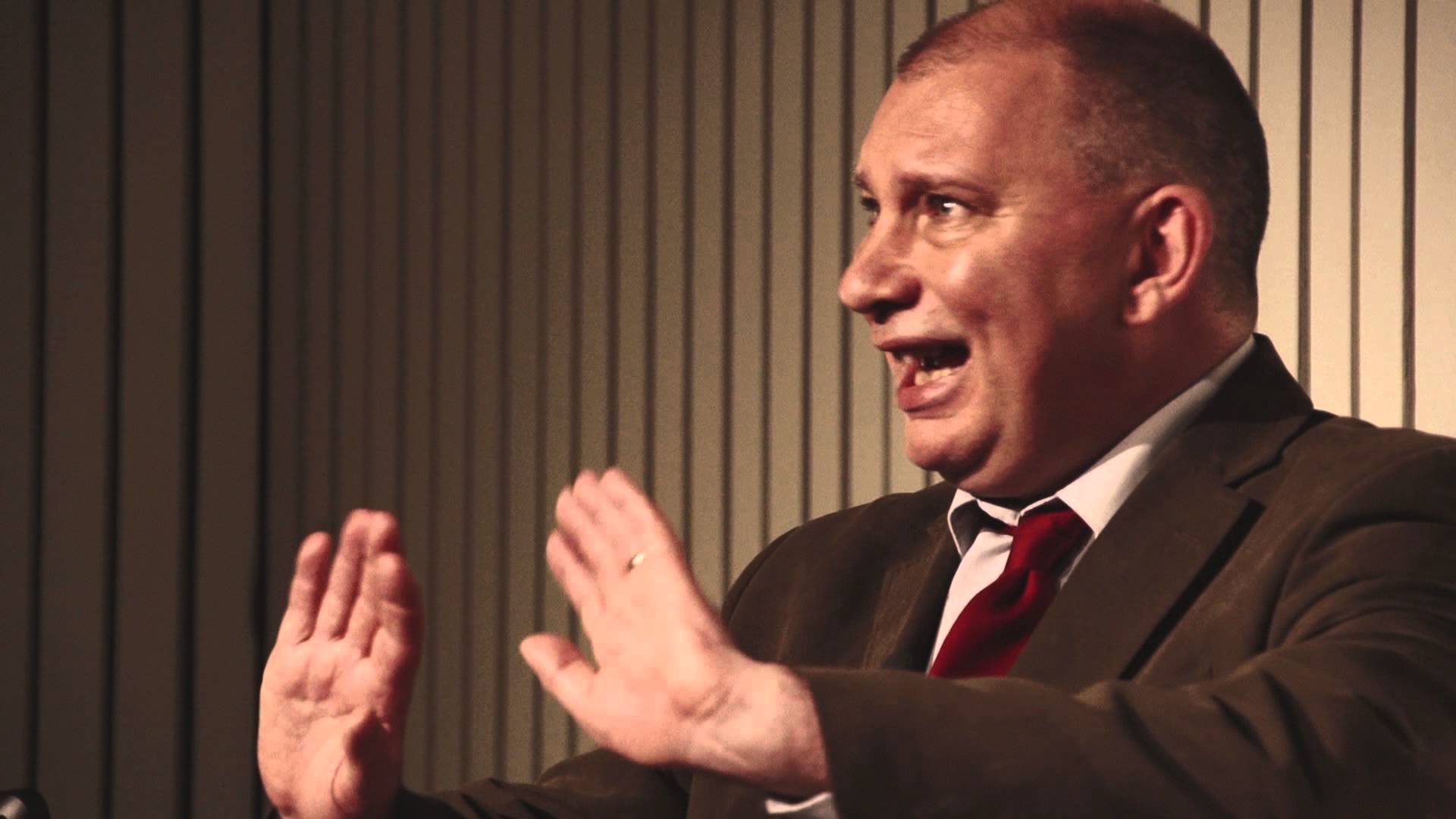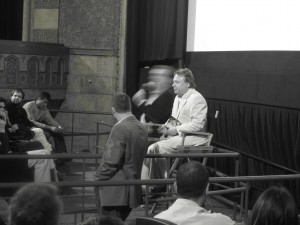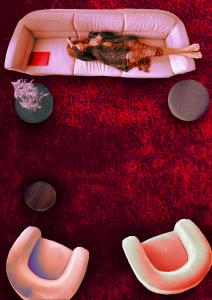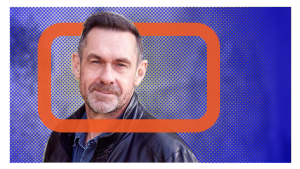
“There’s a big hole where the left should be.” An interview with Nick Cohen
by Peter Huhne | January 8, 2015
“This division of a left represented by Yasmin Alibhai-Brown and a right represented by Peter Hitchens: no one is like that in British society. It is a media creation. They’re equally contemptible, predictable, immune to evidence, what’s the point?”
Nick Cohen is a journalist whose political journey has been similar to that of Christopher Hitchens, Salman Rushdie and Martin Amis. Like them, he began his career as an avowed left-winger, but his support for the Iraq war set him at odds with the majority of the left wing. His ideology has, over the last decade, been defined by his opposition to what he feels to be the decline of the Western left: where before it espoused solidarity, now it is relativist and anti-internationalist. Over drinks in the Guardian bar in Islington, he justifies his political philosophy.
The left, he says, is guilty of “a certain kind of thinking which suggests that the only enemy is the West. You can stand on the border of the Golan heights and say “you’re not allowed to think about that”, and then look the other way and say “you’re allowed to think about that”.
I am a believer in what were the best left-wing values in solidarity, women’s rights, secularisation, opposition to religion, opposition to the hereditary principle. At the moment that is not the dominant view in the rich world. People can call themselves left wing, be consumerist, inert and even racist.
The left needs to be universal in its principles. The right can’t do this stuff, the right doesn’t know how to be feminists. I talk to lots of left wing Muslims and they keep being invited to conservative dos and they just say ‘this is all wrong, it doesn’t work out’. There’s a big hole where the left should be.”
Cohen is clear about what issues the left should address. “I’m a feminist. Women’s emancipation remains the most important cause in the 20th century. I am genuinely shocked at how little women have advanced. The tolerance of sexism, particularly of religiously-imposed sexism, is scandalous.”
He is equally clear about where the left is failing. “The SWP should have been buried years ago. The far left are the far right: they’re allied with radical Islam. If you are a British Bangladeshi woman at Oxford and want to fight for women’s rights, the last people you can turn to are the far left. Now to find them allying with Kumati Islam and the Muslim Brotherhood, it is kind of a final disgrace.”
Citing the SWP as the left, however, seems to exaggerate their importance. The Labour Party has the highest number of Muslim MPs of any political party, and the shadow justice secretary, Sadiq Khan, is a practicing Muslim.
Cohen is a journalist who wants to change things, rather than just comment on them. Why, then, does he not join the labour party?
“I’m not a joiner. I don’t join political parties. I was hugely tempted when Cameron went into Downing Street. I had the web page up and my credit card out, then Peter Preston walked past. Peter said ‘No! No! You’re a journalist!’ He was editor in the 80s: half his staff were Labour, half SDP. He said ‘I used to fucking hate it.’ I said ‘right Peter.’ I pressed the delete button. It was just seeing all these Etonians, I just thought ‘What the fuck!’”
But he wrote Waiting for the Etonians in 2008, I say, he anticipated it.“It’s one thing waiting for the Etonians; it’s a different thing seeing them come into your house and start ordering you around. With Thatcher, what made you really hate her was that she was establishing a society which worked well enough for enough people. I just find this government ridiculous. It’s a nonsense government. A footnote in history. But your generation has never experienced a Tory government. If you are 20 years old, on the dole, and your benefits are being cut and you don’t get the educational maintenance allowance, you don’t think like me at all, and it’s wrong to ask you to.”
But has the left ever been as committed to solidarity as he suggests? Eric Hobsbawm remained an avowed communist even after the Hunagarian repression of 1956. Even in the mainstream British left, Attlee was less than enthusiastic to give India independence.
And what is his verdict on Tony Blair? He was a strong supporter of Blair’s, at least on foreign policy, yet recently he wrote that Blair’s “moral decline and fall is now complete”.
“The best side of Blair was that he intervened in Sierra Leone, Kosovo, Afghanistan and Iraq, some of the most barbarous regimes in the world. Now he’s taking millions of money from Kazakhstan, which doesn’t respect human rights. It’s not me that’s diverged. I am a true Blairite in this argument. I never thought I’d say that.”
Cohen is especially animated when describing his fellow left-wingers: Noam Chomsky, Robert Fisk, John Pilger and others, who he has decried in the press for over a decade.
“With Chomsky, it’s mainly Bosnia: he supported the modern equivalent of holocaust deniers, denying the massacres at Srebrenica, denying the existence of camps where Muslims were rounded up, and did it in the sly way of the practiced liar. Very cleverly done, not quite saying this massacre isn’t happening, but massively pumping up people who did. Chomsky can’t call himself a Marxist, because if he did he’d have to stick to a programme. He’d have to say ‘I’m criticising you on this and that. I believe this’. As soon as you say ‘I believe this’ you’re committed and you’re open to criticism. Chomsky is a Stalinist without Stalin, a leftist without a left, a Manichean.”
Chomsky’s reply was similarly disparaging: “The people he is presumably alluding to never denied the massacres at Srebrenica and in the case of the camps he has in mind, paid attention to the original eye-witness report of his hero Ed Vulliamy (never revised on the basis of any evidence) and the final conclusions of the UK’s most prestigious photo-journalist, Philip Knightley. All this apart from the remarkable spectacle of a leading and vulgar apologist for atrocities having the gall to slander others with false charges about crimes that do not come close to those in which he happily participates (as a taxpayer, and apologist).”
Cohen goes on: “Fisk lies all the time. I mean real lying: he just makes it up. Fisk writes these heart-rending scenes of massacre and despair. But the picture editor phones up the photographer and says ‘where are the pictures?’ The photographer says, ‘he’s been in the hotel all day. The only time I wasn’t with Bob Fisk was when he went to the loo. Perhaps that massacre happened then’. He’s telling readers what they want to hear. The Independent, to its shame, knows perfectly well he makes it up. Has known for years. Won’t do anything about it.
Pilger’s been writing the same article since 1970. I read him once a long time ago and he told me all he had to say. In Chile and Brazil you’ve had sensible centre-left government, trying to build productive economies with strong welfare states. Who do the left fucking go after? Chavez. An oil-rich autocracy with massive corruption, massive crime, political cronies making a fortune out of the oil industry.
It’s the political equivalent of sex tourism. Alienated leftists who have lost all concept of their own society, tour the world looking for political thrills, just like sex tourists tour the world looking for girls or boys to screw. Chavez and Venezuela is as much of a fantasy for the left as Thailand is a fantasy for the fat middle aged man who thinks these girls really find him attractive.”
When I suggest that the Guardian has proved it can listen to the other side of the argument, in hiring Simon Jenkins as a columnist, Cohen replies: “Typical Guardian: instead of having a serious debate on the left they hire a right-winger. The left think ‘Oh you’re right wing. Ha ha ha ha’. They can’t admit there’s anything wrong from a left wing perspective.”
Yet perhaps Cohen’s exchange with Chomsky shows a commitment within the left to critical re-evaluation. It is hard to imagine Simon Heffer having a similarly open and quite brutal dispute with someone else on the right, Fraser Nelson, say, or Melanie Phillips. Cohen and Chomsky seem to be demonstrating an age old problem with the left: the ability, even the will, to destroy itself through infighting.
Where the right in Britain through most of the twentieth century has been ruthlessly united due to its thirst for power, the Labour party has seen infighting: Bevanites against the Gaitskellites and the Bennites against the Owenites.
Cohen is controversial and outspoken. What influenced him to become a journalist? “I was brought up in the North of England in the Seventies. I was hugely prejudiced against homosexuality. Gore Vidal is one of the few writers who changed my life. I sat down and read Gore’s essay on ‘The Neo-Cons and the Gays’ and I thought ‘fucking hell. Right. Never again will I be prejudiced against anything gay, ever.’”
Cohen seems also to have been influenced by his old comrade Christopher Hitchens, a man who went through a similar political journey. “Christopher had no interest in economics, which is unusual for a Marxist. Mind you if you knew anything about economics you wouldn’t be a Marxist. I dedicated my book to him because he was ill and it was terrible. But also because Christopher was one of the most intellectually generous people I’ve ever met. With Christopher, if you had a book to write, you’d take him to a restaurant, a pub, he’d say ‘have you read this, have you looked at this?’: it was like having the best tutorial ever. Admittedly by the end you were so howling drunk you’d be in danger of forgetting everything he said, and he, bastard, would be absolutely fine, slightly pink.”
Some of this may have rubbed off on him more than he thinks. By the time I left him, he’d had four pints. He didn’t seem in the least affected. In fact, he went back upstairs to his office to write his weekly article, as polemical as ever. I returned to Oxford, not entirely convinced that the left has changed to the degree he argues, and with a significant headache.




